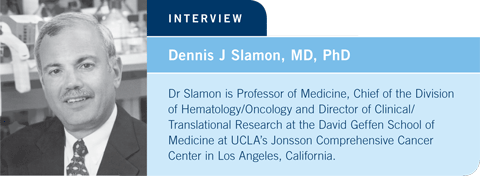
 |
||||||||||||||

| Tracks 1-5 | ||||||||||||
|
Select Excerpts from the Interview
Track 1
![]() DR LOVE: Can you review the results from the adjuvant trastuzumab trials?
DR LOVE: Can you review the results from the adjuvant trastuzumab trials?
![]() DR SLAMON: Within about a year, four adjuvant trastuzumab trials reported
essentially the same benefit. The benefit was larger than anticipated, and all
of the trials were massively overpowered. Among the four trials, there were
13,000 patients randomly assigned to a trastuzumab- versus a nontrastuzumab-based
therapy.
DR SLAMON: Within about a year, four adjuvant trastuzumab trials reported
essentially the same benefit. The benefit was larger than anticipated, and all
of the trials were massively overpowered. Among the four trials, there were
13,000 patients randomly assigned to a trastuzumab- versus a nontrastuzumab-based
therapy.
The trials demonstrated approximately a 50 percent reduction in the risk of recurrence and a 30 percent improvement in survival for patients who received trastuzumab (Joensuu 2006; Piccart-Gebhart 2005; Romond 2005; Slamon 2006; [2.1]).
![]() DR LOVE: What about side effects and toxicities associated with adjuvant
trastuzumab?
DR LOVE: What about side effects and toxicities associated with adjuvant
trastuzumab?
![]() DR SLAMON: The only important toxicity associated with trastuzumab has
been cardiotoxicity, in particular when used in combination with anthracycline-
based chemotherapy.
DR SLAMON: The only important toxicity associated with trastuzumab has
been cardiotoxicity, in particular when used in combination with anthracycline-
based chemotherapy.
Otherwise, trastuzumab is a forgiving drug. It does not have any of the side effects associated with our usual chemotherapies or even some of our hormonal therapies.

Track 2
![]() DR LOVE: The BCIRG 006 trial, which you led, was the only study
evaluating trastuzumab with a nonanthracycline-containing regimen —
TCH (docetaxel/carboplatin/trastuzumab). What did you see?
DR LOVE: The BCIRG 006 trial, which you led, was the only study
evaluating trastuzumab with a nonanthracycline-containing regimen —
TCH (docetaxel/carboplatin/trastuzumab). What did you see?
![]() DR SLAMON: We saw no increase in cardiotoxicity over AC
DR SLAMON: We saw no increase in cardiotoxicity over AC![]() T (doxorubicin/
cyclophosphamide
T (doxorubicin/
cyclophosphamide![]() docetaxel; [Slamon 2006]). In terms of efficacy, the
updated analysis of BCIRG 006 demonstrated that both experimental arms,
AC
docetaxel; [Slamon 2006]). In terms of efficacy, the
updated analysis of BCIRG 006 demonstrated that both experimental arms,
AC![]() TH (doxorubicin/cyclophosphamide
TH (doxorubicin/cyclophosphamide![]() docetaxel/trastuzumab) and
TCH, were superior to the nontrastuzumab-containing regimen (Slamon 2006).
docetaxel/trastuzumab) and
TCH, were superior to the nontrastuzumab-containing regimen (Slamon 2006).
No data demonstrate that an anthracycline adds incremental benefit compared to a nonanthracycline regimen with trastuzumab. If you use the nonanthracycline regimen, TCH, you see exactly the same benefit as the anthracycline-based regimen — the curves are identical. They overlap completely.
So most patients derive no benefit from anthracycline-based therapy with trastuzumab in terms of an incremental improvement, but they derive all the toxicity, cardiomyopathies, congestive heart failure, leukemia and myelodysplasia. Therefore, I don’t believe there’s a role for anthracyclines in the adjuvant setting when you are using trastuzumab.
Tracks 3-4
![]() DR LOVE: What about using adjuvant trastuzumab without chemotherapy
in the older or the frail patient?
DR LOVE: What about using adjuvant trastuzumab without chemotherapy
in the older or the frail patient?
![]() DR SLAMON: Off study, we’ve done that at our institution a number of times
— any time we think there may be a complication from chemotherapy.
DR SLAMON: Off study, we’ve done that at our institution a number of times
— any time we think there may be a complication from chemotherapy.
However, data show that irrespective of chronologic age, if the patient has a good performance status, she benefits from chemotherapy. So we want to offer the elderly patients every advantage.
That said, we shouldn’t look for trouble. We know that certain regimens could cause problems when used together. If any kind of dysfunction or performance status issues exist, I think trastuzumab monotherapy makes sense. However, we have no clinical trial data to support that.
![]() DR LOVE: What about patients with node-negative, HER2-positive disease
— particularly smaller tumors?
DR LOVE: What about patients with node-negative, HER2-positive disease
— particularly smaller tumors?
![]() DR SLAMON: The data, thus far, have demonstrated that the relative benefit
for a patient with node-negative disease appears to be similar to the benefit
for a patient with node-positive disease in terms of the relative risk reduction
(Slamon 2006).
DR SLAMON: The data, thus far, have demonstrated that the relative benefit
for a patient with node-negative disease appears to be similar to the benefit
for a patient with node-positive disease in terms of the relative risk reduction
(Slamon 2006).
In terms of tumor size — greater than two centimeters or less than two centimeters — it looks as if the benefit may be the same in both of those groups (Slamon 2006).
We’re moving away from measuring the tumor and counting the number of positive nodes and looking more closely at how the tumor is wired. If it’s wired as HER2-positive, it is likely to be an aggressive tumor and should be treated as such.
| Table of Contents | Top of Page |